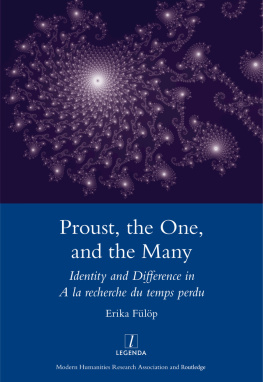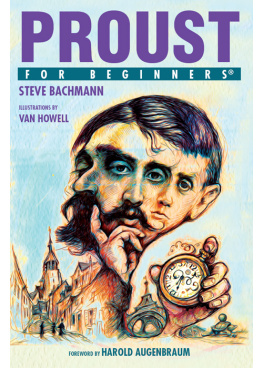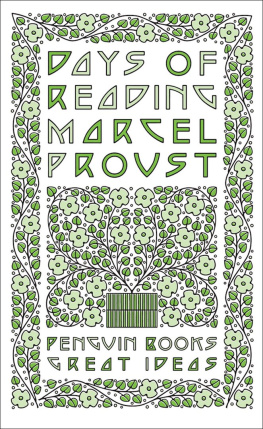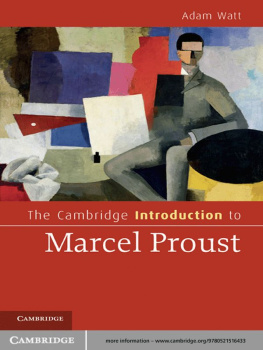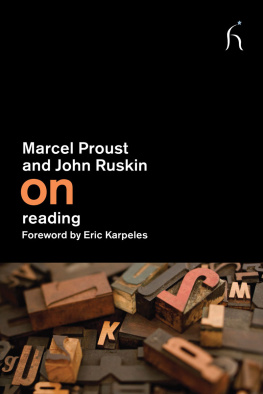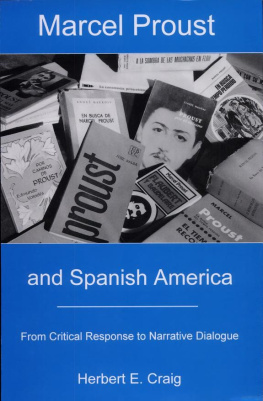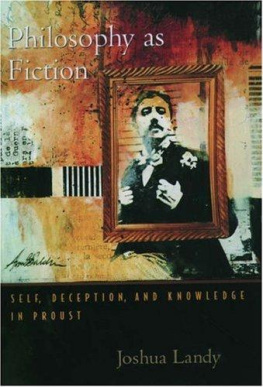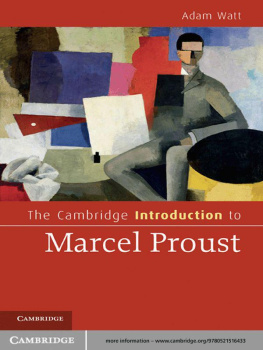PROUST, THE ONE, AND THE MANY
IDENTITY AND DIFFERENCE IN A LA RECHERCHE DU TEMPS PERDU
Legenda
LEGENDA, founded in 1995 by the European Humanities Research Centre of the University of Oxford, is now a joint imprint of the Modern Humanities Research Association and Routledge. Titles range from medieval texts to contemporary cinema and form a widely comparative view of the modern humanities, including works on Arabic, Catalan, English, French, German, Greek, Italian, Portuguese, Russian, Spanish, and Yiddish literature. An Editorial Board of distinguished academic specialists works in collaboration with leading scholarly bodies such as the Society for French Studies and the British Comparative Literature Association.

The Modern Humanities Research Association (MHRA) encourages and promotes advanced study and research in the field of the modern humanities, especially modern European languages and literature, including English, and also cinema. It also aims to break down the barriers between scholars working in different disciplines and to maintain the unity of humanistic scholarship in the face of increasing specialization. The Association fulfils this purpose primarily through the publication of journals, bibliographies, monographs and other aids to research.

Routledge is a global publisher of academic books, journals and online resources in the humanities and social sciences. Founded in 1836, it has published many of the greatest thinkers and scholars of the last hundred years, including adorno, einstein, Russell, Popper, Wittgenstein, lung, Bohm, Hayek, Mcluhan, Marcuse and Sartre. Today Routledge is one of the world's leading academic publishers in the Humanities and Social Sciences. It publishes thousands of books and journals each year, serving scholars, instructors, and professional communities worldwide.
www.routledge.com
Editorial Board
Chairman
Professor Colin Davis, Royal Holloway, University of London
Professor Malcolm Cook, University of Exeter (French)
Professor Robin Fiddian, Wadham College, Oxford (Spanish)
Professor Anne Fuchs, University of St Andrews (German)
Professor Paul Garner, University of Leeds (Spanish)
Professor Andrew Hadfield, University of Sussex (English)
Professor Marian Hobson Jeanneret, Queen Mary University of London (French)
Professor Catriona Kelly, New College, Oxford (Russian)
Professor Martin McLaughlin, Magdalen College, Oxford (Italian)
Professor Martin Maiden, Trinity College, Oxford (Linguistics)
Professor Peter Matthews, St Johns College, Cambridge (Linguistics)
Dr Stephen Parkinson, Linacre College, Oxford (Portuguese)
Professor Suzanne Raitt, William and Mary College, Virginia (English)
Professor Ritchie Robertson, The Queens College, Oxford (German)
Professor David Shepherd, Keele University (Russian)
Professor Michael Sheringham, All Souls College, Oxford (French)
Professor Alison Sinclair, Clare College, Cambridge (Spanish)
Professor David Treece, Kings College London (Portuguese)
Managing Editor
Dr Graham Nelson
41 Wellington Square, Oxford OX1 2JF, UK
legenda@mhra.org.uk
www.legenda.mhra.org.uk
Proust, the One, and the Many
Identity and Difference in A la recherche du temps perdu
ERIKA FLP
Modern Humanities Research Association and Routledge 2012
First published 2012
Published by the
Modern Humanities Research Association and Routledge
2 Park Square, Milton Park, Abingdon, Oxon OX14 4RN
711 Third Avenue, New York, NY 10017, USA
LEGENDA is an imprint of the Modern Humanities Research Association and Routledge
Routledge is an imprint of the Taylor & Francis Group, an informa business
Modern Humanities Research Association and Taylor & Francis 2012
ISBN 978-1-907975-32-5 (hbk)
All rights reserved. No part of this publication may be reproduced, stored in a retrieval system, or transmitted in any form or by any means, electronic, mechanical, including photocopying, recordings, fax or otherwise, without the prior written permission of the copyright owner and the publisher.
Product or corporate names may be trademarks or registered trademarks, and are used only for identification and explanation without intent to infringe.
Contents
Guide
To my family and mentors
Csaldomnak s mentoraimnak
This book is based on my doctoral thesis completed at the University of Aberdeen in 2009. However, the journey of these reflections began in Hungary and France and now ends in Malta, and in each of these countries I have received much support for which I am infinitely grateful.
First of all, I would like to thank the University of Debrecen in Hungary for the scholarship that allowed me to first immerse myself in Proust, and my teachers there, Tivadar Gorilovics, Anna Szab, and Lieve Spaas, for their encouragement and continuing support. I am grateful to the University of Aberdeen for the generous Sixth Century Studentship, which then made it possible for me to complete the first version of this study. I could not have wished for better supervisors than Nikolaj Lbecker, Michael Syrotinski, and Ian Maclachlan, who let me explore and follow my ways, while offering guidance whenever I needed, even after I left Aberdeen. I would also like to thank my PhD examiners, Edward Hughes and Nick Nesbitt, for the precious advice on the first version of the manuscript, and to James Reid, Arturo Leyte, Bob Plant, Etienne Dougherty-Messi, Elles Smallegoor, and Tom Baldwin for their insightful comments at different stages of the writing process.
My special thanks go to Warren Rogers, the most attentive and interested of proofreaders, to Roger Ravet and Heike Pichler for making sure that my translations are correct, and to Emma Grey and Jenelle Grant for their last-minute assistance from faraway libraries. I would like to thank Graham Nelson at Legenda for his support and patience during the preparation of the manuscript. Last but not least, my family and Natalie can never be thanked enough for always being there for me.
E.F., Malta, September 2011
Unless otherwise stated, all translations are my own and all emphasis in the text is by the author of that text.
Whenever a text and its published translations are quoted, the reference provided in square brackets refers to the indicated translation.
I have used the following abbreviations throughout:
- AS Friedrich Wilhelm Joseph von Schelling, Ausgewhlte Schriften , 6 vols (Frankfurt am Main: Suhrkamp, 1985)
- BN Jean-Paul Sartre, Being and Nothingness: An Essay on Phenomenological Ontology , trans. by Hazel E. Barnes (London: Routledge, 2003)
- DR Gilles Deleuze, Diffrence et rptition (Paris: Presses Universitaires de France, 1968) [ Difference and Repetition , trans. by Paul Patton (London: Continuum, 2004)]
- EN Jean-Paul Sartre, Ltre et le nant: Essai dontologie phnomnologique (Paris: Gallimard, coll. tel, 1976)
- NP Gilles Deleuze, Nietzsche et la philosophie , 4th edn (Paris: Quadrige/PUF, 2003) [ Nietzsche and Philosophy , trans. by Hugh Tomlinson (London: Continuum, 2006)]

